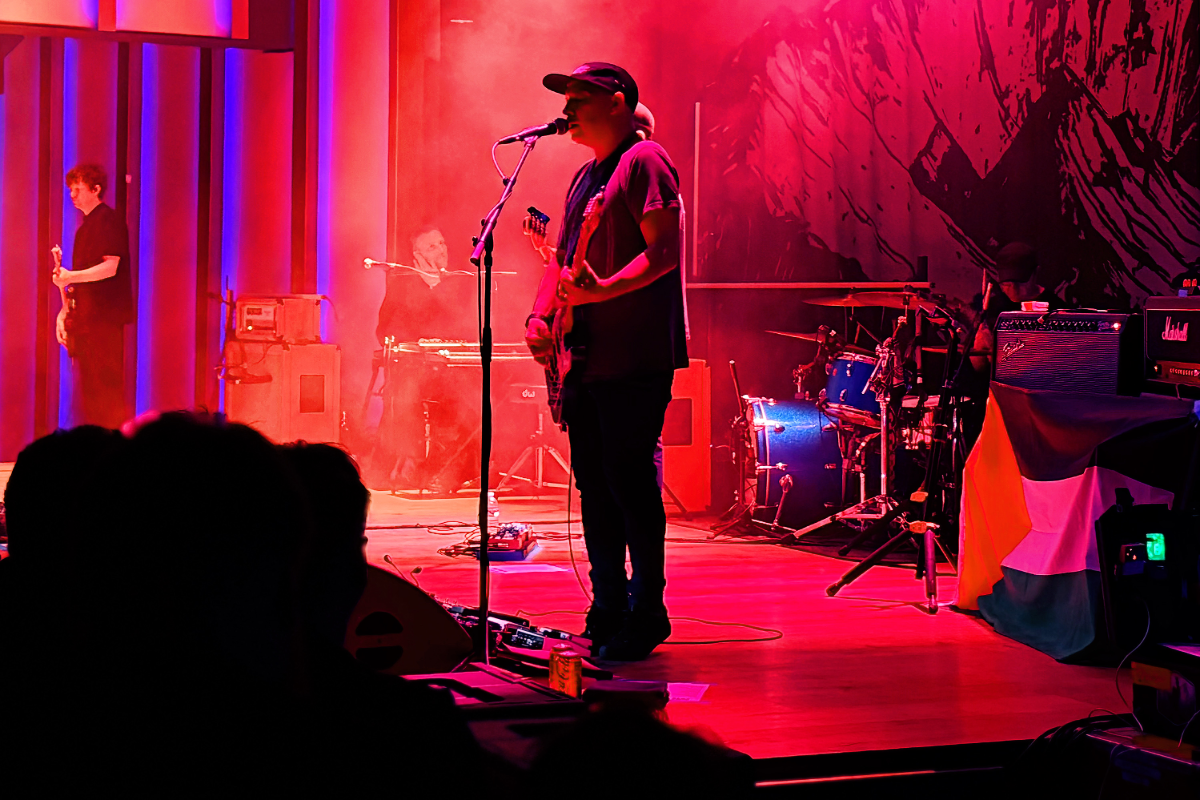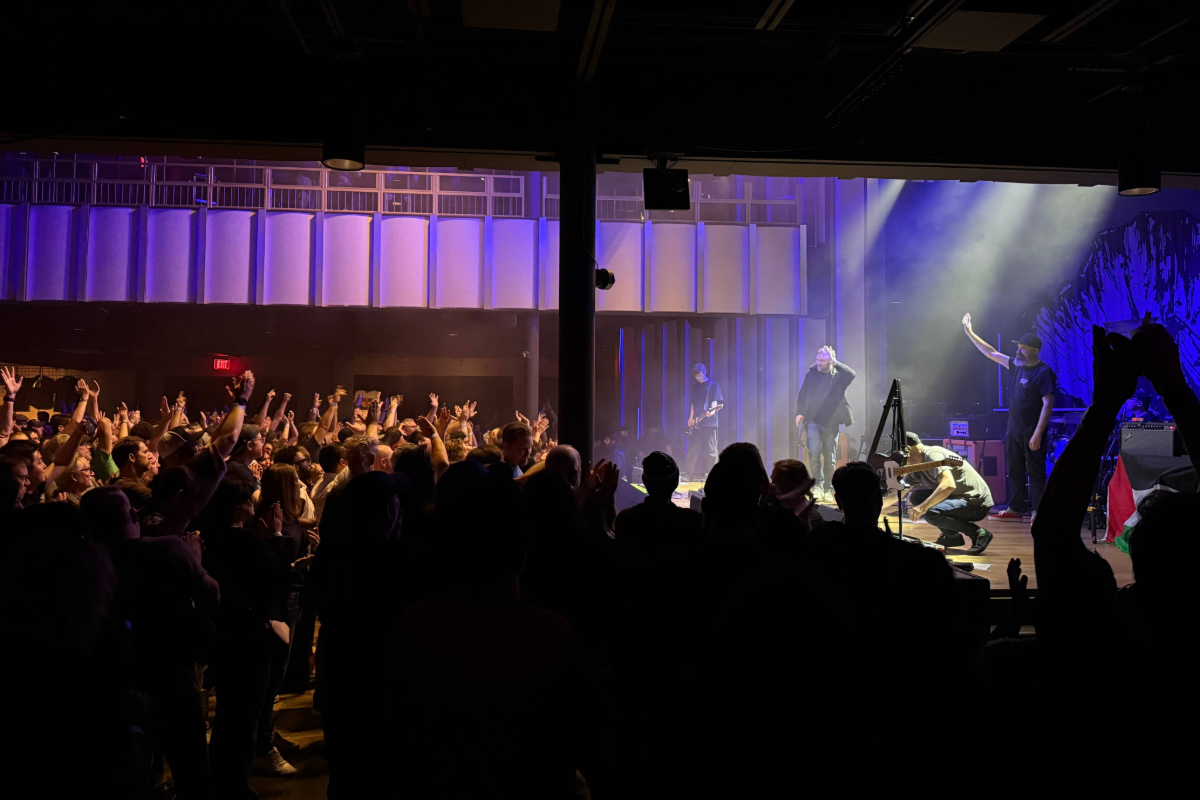
Preston Barta

Audio By Carbonatix
Mogwai wrapped up the North American leg of their Bad Fire World Tour Sunday night at the Echo Lounge & Music Hall in Dallas, marking their first return since 2019 and their eighth performance in the city overall. Their Dallas debut was in 2001 at Trees, in a much more modest setting compared to the polished and modern intimacy of the Echo Lounge.
The Echo Lounge, located in the heart of the Design District, provided the perfect setting for such an intimate and emotionally charged night. Though its exterior exuded the clean lines of corporate minimalism, the venue’s interior was warm and engaging. Some fans swore they spotted Stuart Braithwaite, Mogwai’s frontman and guitarist, doing laps outside before the show with earbuds in, a ritualistic warm-up perhaps only he could explain.
The night kicked off with David Pajo, or Papa M, whose emotional and inventive set was the perfect prelude to Mogwai’s sonic fireworks. A Texas native, Pajo commands attention with his thoughtful guitar work, blending quiet introspection with moments of experimental distortion. For listeners unfamiliar with his music, songs like “Over Jordan,” which evokes a haunting, Americana feel, and “Safeless,” showing his more intense and experimental side, are excellent entry points into his catalog. On stage, Pajo was a picture of humility, expressing his admiration for Mogwai and gratitude for being part of the tour. His performance set the tone for the night, creating a space of deep connection and anticipation.
By the time Mogwai took the stage, the energy in the room was electric. The first notes of “God Gets You Back”-a standout track from their latest album, The Bad Fire-rolled across the crowd like a warm breeze. Guitarist Barry Burns delivered eerily digitized vocals, intoning the line “Count the roads, Dallas eyes,” a subtle yet pointed lyric that hit close to home for the local audience. It was a tender opening, wrapping the room in the slow build Mogwai does so well, before opening the floodgates with the full force of their sound.
From there, Mogwai crafted a masterful set that ebbed and flowed between moments of serene beauty and heart-thumping intensity. Tracks like “Ritchie Sacramento,” with its memorable lyrics and emotional guitar work, had the crowd gently swaying, while the hypnotic synthesis of “Remurdered” gave the audience a taste of Mogwai’s more experimental side. Watching Burns and bassist Dominic Aitchison duel on keyboards during this track was mesmerizing as if the song had been conjured straight out of a sci-fi soundtrack.
This part of the show reminded us of what Braithwaite shared with us during a conversation at SXSW, where they discussed their music, performance style and their new documentary capturing their career. He spoke on their 30-year revolution, highlighted in their newly released documentary, Mogwai: If the Stars Had Sound. “Some songs come alive in ways you don’t expect when you’ve played them live for years,” he says. “It’s like they pick up new meaning as we and the listeners change.”
This sentiment was particularly palpable during “Like Herod,” a song that has been a mainstay in Mogwai’s live shows for decades, including their 2001 performance at Trees. Its unsettling basslines and moments of thunderous distortion kept the audience on edge, waiting for its unpredictable bursts of chaos.
The evening’s peak came with the finale, “My Father My King.” Clocking in at over 20 minutes, the performance built slowly, layering guitars and drums into an overwhelming crescendo of sound. The walls of the Echo Lounge seemed to vibrate, and the audience stood rooted, fully immersed. Drummer Martin Bulloch explained during our earlier chat, “When we play songs like that, it’s about finding ways to make the audience feel something they’ve never felt before. That’s the goal, at least.”

The band returns to Glasgow to pick up where they left off, celebrating their storied career with hometown fans.
Preston Barta
Beyond the music, the visuals brought a striking depth to the night’s atmosphere. Shifting beams of multicolored light pulsed and danced in harmony with Mogwai’s rhythms, enveloping the audience in a dreamlike, almost otherworldly ambiance. Behind Braithwaite, a Palestinian flag hung quietly, a powerful yet understated gesture of solidarity. Its presence was a poignant reminder that Mogwai’s music is not just an auditory experience but a reflection of deeper social consciousness grounded in a connection to the world beyond the stage.
Reflecting on their enduring legacy, Braithwaite remarked to us, “We just never think we’re as good as we can be. You’re always trying to do something better.”
That relentless drive was clear during the night’s set, which leaned heavily on The Bad Fire but also revisited key moments from their discography. Audience members cheered for “2 Rights Make 1 Wrong” from 2001’s Rock Action, its unmistakable melancholy mixed with hope. Though songs like “Helicon 1” and “Kids Will Be Skeletons” were left off the setlist, the evening felt complete, a testament to the emotional depth of every track performed.
The band’s three-decade milestone was quietly acknowledged throughout the night, though not in the form of overt speeches or tributes. Instead, it was reflected in the music itself, which spoke louder than words.
As the final notes faded and the venue’s house lights illuminated the room, fans began their exit with a mix of euphoria and disbelief. More than just a show, it was an emotional send-off for the North American leg of the tour and a reminder of why Mogwai remains eternal in the hearts of so many listeners.